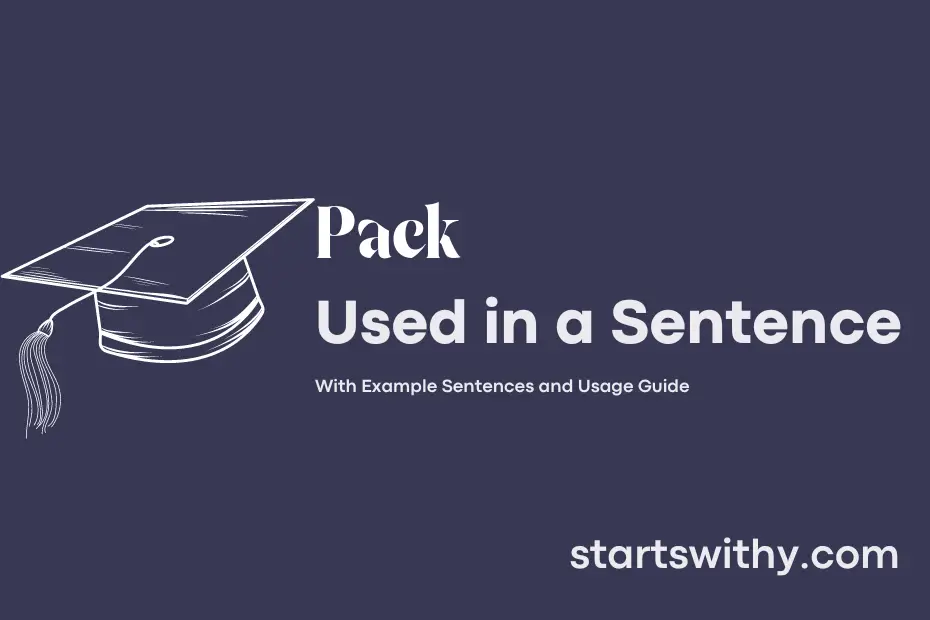Ever wondered how a simple three-letter word like “pack” can be so versatile in the English language? The word “pack” can serve various purposes as both a noun and a verb, making it a handy tool for communication and expression.
As a noun, “pack” refers to a group or collection of items that have been bundled, organized, or wrapped together. On the other hand, when used as a verb, “pack” describes the action of putting things into a container or wrapping them up for storage or transportation. Its flexibility allows for a wide range of meanings and uses in everyday language.
7 Examples Of Pack Used In a Sentence For Kids
- Pack your bag with your books and pencil.
- Let’s pack some snacks for our picnic.
- We need to pack our clothes for the trip.
- Pack your toys away when you are done playing.
- Can you help me pack these boxes?
- Remember to pack your umbrella in case it rains.
- Don’t forget to pack your water bottle for school.
14 Sentences with Pack Examples
- Pack your books and notebooks in your backpack before heading to your classes.
- Don’t forget to pack some snacks to keep you energized during long study sessions.
- Remember to pack your laptop charger so you can work on assignments without interruptions.
- Make sure to pack your ID card to access campus facilities.
- Pack some extra pens and pencils in case you need them during exams.
- Before going home for the holidays, pack your essentials and clothes for the break.
- Pack your sports gear for a quick game after classes.
- Remember to pack your umbrella during the monsoon season to stay dry on campus.
- For group projects, divide tasks among team members and pack accordingly.
- Make a checklist of items to pack for your college trip with friends.
- Organize your study materials and pack them neatly in your study desk.
- It’s important to pack your calculator for exams that allow its use.
- During placement season, pack your professional attire for interviews.
- When attending college events, pack your enthusiasm and spirit to fully participate in the activities.
How To Use Pack in Sentences?
Pack can be used in a sentence to indicate the action of putting items together for transport or storage, or referring to a group of items bundled together.
Here are some examples of how to use “pack” in a sentence:
- “I need to pack my suitcase for our trip tomorrow.”
- “She decided to pack all the boxes neatly before moving them to the new house.”
- “Don’t forget to pack your lunch before heading to work.”
- “The hiker had to pack carefully to ensure he had all the necessary supplies for the trek.”
- “The camper learned how to pack efficiently to fit everything in his backpack.”
Tips for using “pack” in a sentence:
- Pack can refer to arranging items into a container, wrapping, or enclosing them for storage or transportation.
- In some contexts, pack can also mean assembling a group of items or people together in a specific way.
- When using pack in a sentence, consider the context to ensure that the meaning is clear to the reader.
- Think about whether pack is being used as a verb (action) or a noun (group of items) in the sentence.
By following these guidelines and examples, beginners can effectively incorporate the word pack into their sentences with confidence.
Conclusion
In conclusion, the term “pack” is commonly used in various contexts, such as packing for a trip, pack animals carrying heavy loads, or pack sizes in retail products. A pack can refer to a group of similar items bundled together, a container for storing or carrying things, or a group of animals working together. The word is versatile and can be applied to many different situations where items are grouped or bundled for convenience or functionality.
Whether it’s packing a suitcase for a vacation, carrying a pack of wolves, or purchasing a pack of snacks at the store, the concept of a pack can help streamline tasks, organize items efficiently, or optimize resources. Understanding the different meanings and uses of “pack” can enhance communication and promote clarity in various contexts where grouping, bundling, or organizing items is essential.



